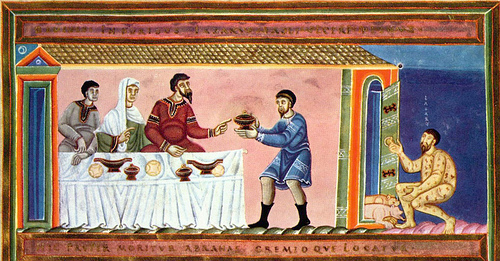
The Atlantic has an article, Why the Rich Don’t Give to Charity: The wealthiest Americans donate 1.3 percent of their income; the poorest, 3.2 percent
The relative generosity of lower-income Americans is accentuated by the fact that, unlike middle-class and wealthy donors, most of them cannot take advantage of the charitable tax deduction, because they do not itemize deductions on their income-tax returns.
American rich are far more generous than the rich in other countries, and give substantial amounts, more in absolute terms than the poor, of course. But they tend to give to elite institutions: Harvard, The Metropolitan Museum, orchestras, conservancies. The poor give to religious organizations and social service organizations.
Researchers theorizes that the lack of generosity is because the rich have no contact with the poor:
Consistent with previous studies, they found that less affluent ZIP codes gave relatively more. Around Washington, D.C., for instance, middle- and lower-income neighborhoods, such as Suitland and Capitol Heights in Prince George’s County, Maryland, gave proportionally more than the tony neighborhoods of Bethesda, Maryland, and McLean, Virginia. But the researchers also found something else: differences in behavior among wealthy households, depending on the type of neighborhood they lived in. Wealthy people who lived in homogeneously affluent areas—areas where more than 40 percent of households earned at least $200,000 a year—were less generous than comparably wealthy people who lived in more socioeconomically diverse surroundings. It seems that insulation from people in need may dampen the charitable impulse.
In college I worked several summers as a substitute mailman in Baltimore’s zone 18, which included slums in the south along North Avenue, working and middle class neighborhoods along York Road, and mansions in Guilford, houses in which the mail was sometimes delivered to the servants’ entrance and taken by the butler.
We were warned not to put our fingers through mail slots in the slums, because we might be bitten by rats. We were also told if we were approached by someone who demanded money, to tell him that all the money belonged to the federal government, and it was a federal offence to take any. I was approached once in a back alley, and the would-be mugger apparently decided that a federal case was not worth a few dollars.
Because I was a substitute I did not know the routes and it took me longer to deliver the mail. In Guilford I would sometimes get surly remarks about how I was much later than the regular mailman and they would report me.
In the working class neighborhoods people took pity on a college student in August and frequently offered me water or ice tea and even invited me to take a brief rest on the porch.
I also had a brief and unsuccessful career as a waiter.
If restaurant service is at all decent, I leave at least 20%, because I know how hard it is to be on your feet all day. I also give the garbage men a large tip at Christmas. I also try to help people who have fallen into hard straights.
College students tend to work in summer internships rather than service industries or construction, and they do not have the experience of what it is to do something physically tiring to earn one’s daily bread –and often little else. A little more experience of the difficulties of the poor might make the well-off more generous- I think 5% is a reasonable goal, 2% to institutions, 3% to the poor. The standard for millennia has been 10% – without tax deductibility.